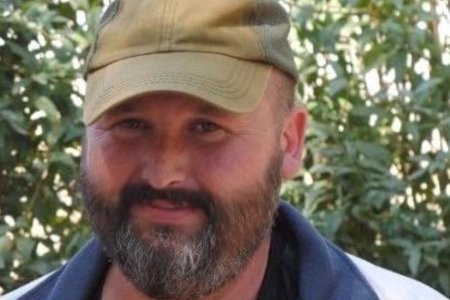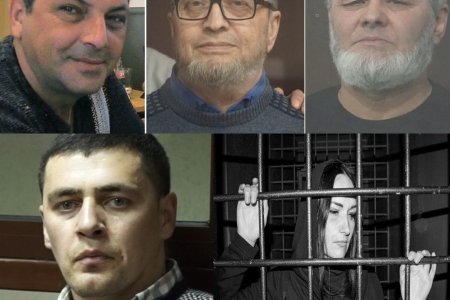
Ukrainian political prisoner Ivan Yatskin is receiving no medical care for serious health issues in Russian captivity, with the prison staff, according to his wife, Gulnara Kadyrova, finding any pretext to imprison him in the particularly bad conditions of a Russian SHIZO, or punishment cell. During the last such ‘punishment’, he was held in a cell without shoes and with a window left open, in Russian winter temperatures, for 24 hours. Gulnara told Suspilne Crimea that she believes this to be deliberate provocation, with the authorities seeking a pretext for lengthening his sentence.
Yatskin’s eyesight is deteriorating, with it becoming harder and harder for him to write letters. The food and conditions in Russian captivity are also very bad and are resulting in problems with his teeth which are not treated.
Yatskin, who is now 44, suffers from chronic problems with the circulatory system (thrombophlebitis), with these particularly affecting the legs. He had undergone a number of operations before his arrest, and should have been under medical supervision. Instead, he has never received any treatment for that condition, or for the painful vascular ulcer which urgently needed treatment. The ulcer developed while he was in detention in occupied Crimea, yet his wife had enormous difficulty even getting the prison staff to pass on the medication and bandages that she had bought for him. While imprisoned in the FSB’s Lefortovo Prison in Moscow, he was placed in a cell with some kind of ‘militant’ (doubtless with pro-Russian views about Russia’s occupation of Crimea and war against Ukraine in general). This was almost certainly deliberate, with the ensuing conflict leaving Yatskin with ongoing chest pain for which he has also received no care.
Ivan Yatskin is one of at least four Ukrainians arrested on separate charges almost immediately after Moscow’s only large exchange of 35 Ukrainian political prisoners and POWs in September 2019. The Kremlin was almost certainly forced to free its most high-profile Ukrainian political prisoners in an exchange mainly for another Ukrainian national, Volodymyr Tsemakh, whom the Dutch public prosecutor wanted to interrogate as a vital witness to the downing by a Russian BUK missile of passenger airliner MH17 over occupied Ukraine.
Yatskin has been imprisoned since 16 October 2019, when armed and masked FSB and other Russian-controlled enforcement officers burst into the family’s home in the Crimean village of Volkovo. Before taking Yatskin away, the FSB pretended to carry out a search, although, according to Gulnara, this was extremely cursory.
Suspicion that Russia was targeting Yatskin because of his firm pro-Ukrainian position was only intensified by the fact that the Russian FSB ‘investigator’ leading the prosecution was Sergei Makhnev, who has been involved in a number of political trials, especially involving Crimean Tatars. The arrest fell on the eve of Ivan’s mother’s birthday. Gulnara has called the moment that she and the children arrived at her mother-in-law’s home, and she had to tell the frail and elderly lady that Ivan had been arrested one of the hardest moments for them all. There have been many such moments, as Gulnara was expecting the couple’s third child, and is bringing up their two sons, Rinat (7), Arsen (6) and daughter, who is just 3, without their father.
Yatskin was charged with ‘state treason in the form of spying’ (under Article 275 of Russia’s criminal code). This is a favourite for Russia’s FSB as it enables all of the ‘court hearings’ to be held behind closed doors, with even Yatskin’s renowned lawyer Nikolai Polozov forced to sign a non-disclosure agreement on pain of criminal persecution.
Such secrecy did not, however, prevent the Memorial Human Rights Centre from perceiving the evident political nature of this case and recognizing Yatskin as a political prisoner. The initial arrest warrant had claimed that, from 14 February to 30 March 2018, on the instructions of Ukraine’s Security Service [SBU], Yatskin had spoken with acquaintances from among law enforcement officers and had “gathered personal data of officers of the police search and operations office in Crimea. And while on the territory of Ukraine from April to July 2016, via the Internet and also personal meetings with SBU officers, he passed on this personal data, constituting a state secret”.
The Memorial Human Rights Centre gain a damning assessment of such claims. There was some suggestion, they noted, that Yatskin might have earlier served in Ukraine’s police force and could, therefore, have known former Ukrainian police officers who later betrayed their oath to Ukraine and worked for Russia. Although some information about search and operations activities can be designated as state secrets, this pertains to details about methods; forces; plans; results; financing; etc), as well as about current or even former secret agents. Any police service in Yatskin’s case would have preceded Russia’s invasion and annexation of Crimea. Accordingly, any information he had would have pertained to activities under Ukrainian law, and would not be applicable under Russian legislation. Memorial pointed out that total secrecy about this or that law enforcement unit is inadmissible and can only foster abuse.
Yatskin’s rights were, at very least, violated over his total isolation for two months, with this making it hard for him to get legal representation and giving the FSB scope to exert pressure on him. Even after Polozov took on the case, brutal treatment and threats against his family were used to try to break the Ukrainian’s resolve.
According to Memorial’s findings, Yatskin had travelled to mainland Ukraine and had taken part in gathering things to help the Ukrainian Army fighting in Donbas. He was also involved later, towards the end of 2015, in the Crimean Blockade (of goods and electricity from Ukraine to Crimea while under Russian occupation).
None of the latter activities are, in any way, illegal but would explain why the FSB would have viewed the Ukrainian as a target for persecution. Memorial called the case against Yatskin part of the constant anti-Ukrainian campaign run since the end of 2013 in the state media and seen in the statements of high-ranking officials in Russia. “One of the components of this campaign has been the initiating of criminal prosecutions against citizens publicly expressing a position on events in Ukraine that diverges from the official stand and directly against Ukrainians”. These include a large number of cases over so-called terrorism or spying. All of such prosecutions are additionally illegal and in violation of international law which prohibits an occupying state from applying its legislation on occupied territory.
On 21 May 2021, ‘judges’ Alla Nikolayevna Khinevych (presiding); Yelena Anatolievna Spasenova; and Vera Vasilievna Yevdokimova from the Russian occupation ‘Crimean high court’ sentenced Yatskin to 11 years’ harsh-regime imprisonment, followed by a further year’s restricted liberty. This was one year shorter than the sentence demanded by ‘prosecutor’ Sergei Ivanovich Chukhraev. Even the sentence was announced behind closed doors, meaning that Yatskin’s elderly mother and his wife were not able to be present.
The sentence was upheld by the Russian Third Court of Appeal on 16 September 2021, with a later, cassation, appeal rejected in June 2022.
Ivan is illegally imprisoned in Russia’s Kemerov oblast, very far from his wife, Gulnara and their small children.
PLEASE WRITE TO HIM!
The letters tell him, and Moscow, that he is not forgotten and that Russia’s treatment of him is under scrutiny. Letters need to be handwritten and in Russian. Please avoid any political subjects or reference to the charges against him. If possible, enclose an envelope and some thin paper, as well as your return address.
If Russian is a problem, the following would be fine, maybe with a photo or card. The envelope can be written in Russian or English letters, but do add Ivan’s year of birth (as below).
Здравствуйте, Иван!
Желаю Вам здоровья и терпения, и очень надеюсь на скорое освобождение. Простите, что мало пишу – мне трудно писать по-русски, но мы все о Вас помним.
[Dear Ivan, I wish you good health, courage and patience and hope that you will soon be released. I’m sorry that this letter is short – it’s hard for me to write in Russian., but you are not forgotten. ]
Address
652600 Россия, Кемеровская область, г. Белово, ул. Аэродромная 2 б, ФКУ ИК-44
Яцкину, Ивану Григорьевичу, 1978 г.р.
[or in English: 652600 Russia, Kemerov oblast, Belovo, Aerodromnaya St. 2b, Colony No. 44
Yatskin, Ivan Grigorevich, b. 1978



